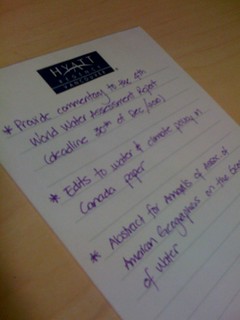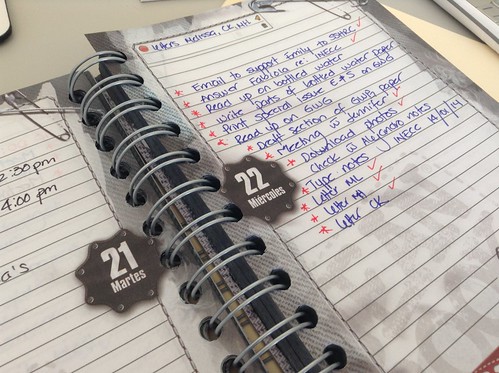One of the issues I struggle with the most is motivation. I am organized, I keep all my plans, schedules, notes, fieldwork scribbles in my Everything Notebook, but sometimes I feel like I have so much to do I just get overwhelmed. While I have learned to break down my workload by the month, week, day, schedule time with buffers, and to focus solely on one task when I’m trying to finish a paper, I still sometimes feel like it’s 2pm and I still have nothing to show for it.
Everyone is boasting about how much #AcWri they got done and I'm here thinking "wow, I managed to eat a bowl of cereal and make my bed".
— Dr Raul Pacheco-Vega (@raulpacheco) July 15, 2016
I have been having really good conversations on Twitter and Facebook with several fellow academics (my good friend from graduate school, Professor Amanda Bittner being one of those key ones) where we discuss our planning, workflow processes, etc. Below is Amanda’s notebook (very similar to my Everything Notebook). Like Amanda, I divide my day in different task types (“Writing”, “Administrative”, “Students”, “Research”, “Data”).
@A_M_Collins @raulpacheco my system is less bullet-y, though. pic.twitter.com/hew067lt6G
— Amanda Bittner (@amandabittner) June 30, 2016
 But I have a very special section: The Quick Wins section. These are small tasks that if I just focus for 15, 30, or 45 minutes I can get them done, and THEN they will make me feel like I have accomplished SOMETHING. My Quick Wins method looks very similar to what Dr. Katherine Firth recommends in this blog post “To Do Lists That Actually Work“. My “Quick Wins” section is Dr. Firth’s “Done List”. When I plan my Quick Wins, I know for a fact that I will actually have the time to finish them. For example, if I have a meeting at 12 noon, and I’m at the office at 10:45am, I am 100% sure I won’t have the time to write for 2 hours straight. Usually my research assistants and administrative assistants meet with me as soon as I get into the office, so that means I am unable to do anything of significance.
But I have a very special section: The Quick Wins section. These are small tasks that if I just focus for 15, 30, or 45 minutes I can get them done, and THEN they will make me feel like I have accomplished SOMETHING. My Quick Wins method looks very similar to what Dr. Katherine Firth recommends in this blog post “To Do Lists That Actually Work“. My “Quick Wins” section is Dr. Firth’s “Done List”. When I plan my Quick Wins, I know for a fact that I will actually have the time to finish them. For example, if I have a meeting at 12 noon, and I’m at the office at 10:45am, I am 100% sure I won’t have the time to write for 2 hours straight. Usually my research assistants and administrative assistants meet with me as soon as I get into the office, so that means I am unable to do anything of significance.
If this happens too frequently, I get frustrated and then I get into a spiral of self-doubt. My brain starts to think: “I write about academic productivity, and it’s 1:30pm and I have NOTHING to show for it“. To keep myself motivated, I need to make sure that I can actually accomplish stuff. So, I create a list of “Quick Wins”.
I call them “quick wins” because they are usually things I can finish in a very short period of time, they are actually meaningful.
Some examples of Quick Wins:
- Read a dissertation chapter of one of my PhD students.
- Write feedback for my Masters’ students on their thesis.
- Draft a memorandum from a journal article I’ve already read and highlighted.
- Type my notes from a research meeting, or from a memorandum I wrote by hand.
- Dump the memorandum in my Excel dump spreadsheet for that particular topic.
- Insert 5 books or 10 journal articles into my Mendeley database, and clean the entries.
- Draft the first version of an abstract for a conference paper).
The idea of a “Done List” isn’t new, but its application in academia still seems like quite recent still. It wasn’t until I read Katherine’s post that I realized her method was similar to mine. It’s a neat mental trick.
AND IT WORKS.
The Quick Wins method is especially suited to be tested using the 30 Minutes Miracle method that Dr. Aimee Morrison offered in Hook and Eye. I set my Quick Wins to blocks of 15, 30 or 45 minutes at the very most because if I have a full hour, then it will definitely go to writing (or any other deep-concentration stuff that I need to do like data analysis).
One fundamental element of the Quick Wins method is that your quick wins need to be
- (a) actually accomplishable within the time frame you set (15, 30, 45 minutes).
- (b) things you can quickly take up again if somebody interrupts you in the middle of finishing one.
- (c) stuff that you don’t need deep concentration for. If you need more than 1 hour, it’s not a Quick Win.
I am currently in the process of testing how many different types of Quick Wins I can do in blocks of 30 minutes, following Dr. Morrison’s suggestion. I’ll let you know how that goes!


One Response
Stay in touch with the conversation, subscribe to the RSS feed for comments on this post.
Continuing the Discussion